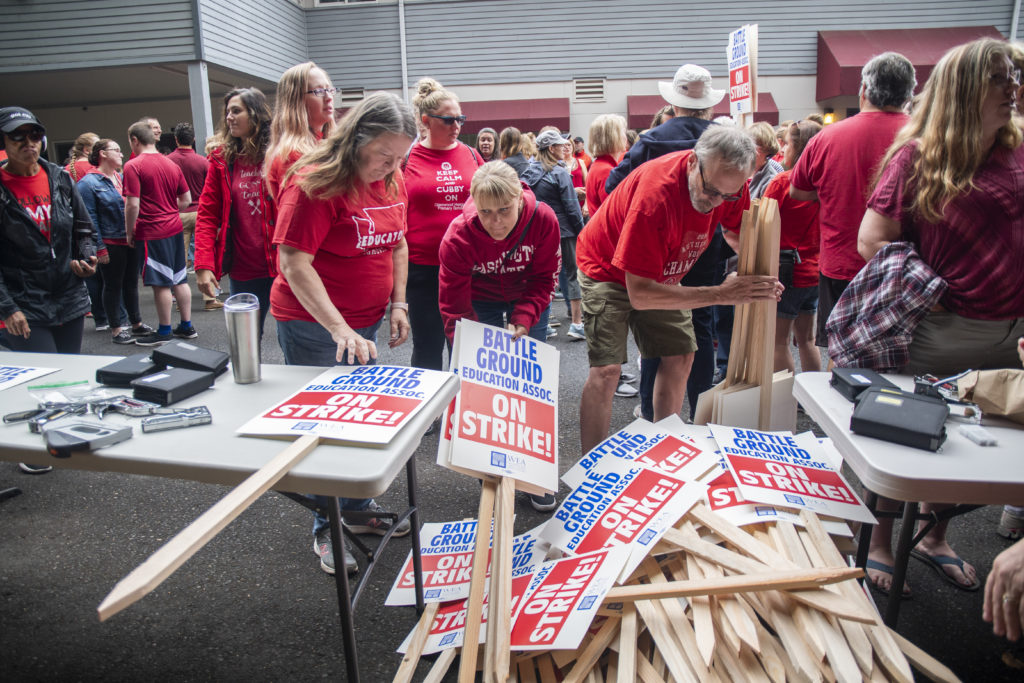As parents and students prepare to head back to school, teachers carry signs after summer-long negotiations within respective districts fall short of an agreement.
In 2012, according to the Washington Education Association (WEA), the Washington Supreme Court ruled in favor of the McCleary decision. This case argued that Washington state public schools were not in compliance with Article IX in the Washington Constitution. Article IX states, “It is the paramount duty of the state to make ample provision for the education of all children residing within its borders, without distinction or preference on account of race, color, caste, or sex.”
In 2014 the Washington State Supreme Court found the state Legislature in contempt of court for not planning to properly fund schools; according to the WEA, this cost the Legislature a fine of $100,000 per day.
On June 7, 2018 as students were released for summer break, the court lifted sanctions, satisfied with the budget approved by the Legislature. The long-awaited funding sent teacher unions sate wide to the bargaining table to ask the districts for the money designated for their salaries.
Now, in response to the McCleary decision, teachers are on strike due to the perceived failure of a concrete budget. According to a 2018 Legislative Report by The Washington Association of School Administrators, the McCleary decision alloted 7.3 billion dollars for increasing teacher salaries. However, local district offices are offering public school staff low percentage raises and using the allocated money elsewhere.
According to Battle Ground Education Association President Linda Peterson, the Battle Ground District Office offered staff a 6.5 percent raise, despite the district being offered a 23.1 percent budget increase for salary allocation.
Peterson has worked in the district for 15 years and has been the president for four years.
When asked why the district’s increase for salary allocation only resulted in a 6.5 percent raise to staff Peterson said, “We know what their understanding or their fear is. We don’t agree with it.”
Dawn Pack, a guidance counselor at Battle Ground High School said “My entire career people have been advocating for teacher salary increase: going to Olympia, writing legislators and participating in lobbying and negotiations and all that stuff.”

Some have considered the idea of the district offering a pay raise by taking away staff’s TRIpay (Time, Responsibility and Incentive pay) and including it in staff salary. TRIpay is additional pay based on staff positions that is not part of official salary. In the Battle Ground school district, debates have revolved around the use of TRIpay and whether or not it should be included in regular salary. This means, hypothetically, if the district offered the union a 4 percent pay increase but also factored in TRIpay, the district could claim that the offer to the union was a 14 percent increase, when it would really only include a 4 percent increase.
“It’s really not a raise at all, it’s just calling what you’re getting a different name,” Pack said.
Since an agreement was not reached before the start of school on Aug. 29, teachers have refused to return to their classrooms and have began striking. By contract, teachers work 180 days. Any school days missed from the strike will be added on to the end of the school year, along with any snow days.
Pack stated, “Ultimately [students] are being punished for the district not offering a competitive salary to their employees.”
“I think Battle Ground School district struggles with transparency in their communication,” she said. “I remain hopeful that our district can come to an agreement with our union.”
As it stands, if salaries are increased, the district is concerned that the budget will not be large enough to cover those staff members who are “unfunded” or not covered by the state salaries, according to Peterson. However, Peterson said, “The difference is that there has been a lot of additional dollars sent to the district by the state. There is money to pay for those salaries.”
“I think it’s very important to note that the educators in our district just want to be with the kids in their classroom,” Peterson said, “but they also recognize that this is a once in a lifetime opportunity to see their salaries increased and it took at least 11 years of advocating in Olympia to force the legislator to actually fund education.”
When asked for an interview or comment on the recent events, Battle Ground District Office said that they could not offer any statement other than the one publicly released: “The BGPS [Battle Ground Public Schools] Board of Directors and leadership team are committed to providing fair local market wages, benefits and working conditions, but the district must do so in a fiscally responsible and sustainable manner.”
Battle Ground school district staff will not return to work until an agreement is met.

Anna Nelson is the Editor in Chief for the VanCougar. She is a senior and is studying strategic communications.
